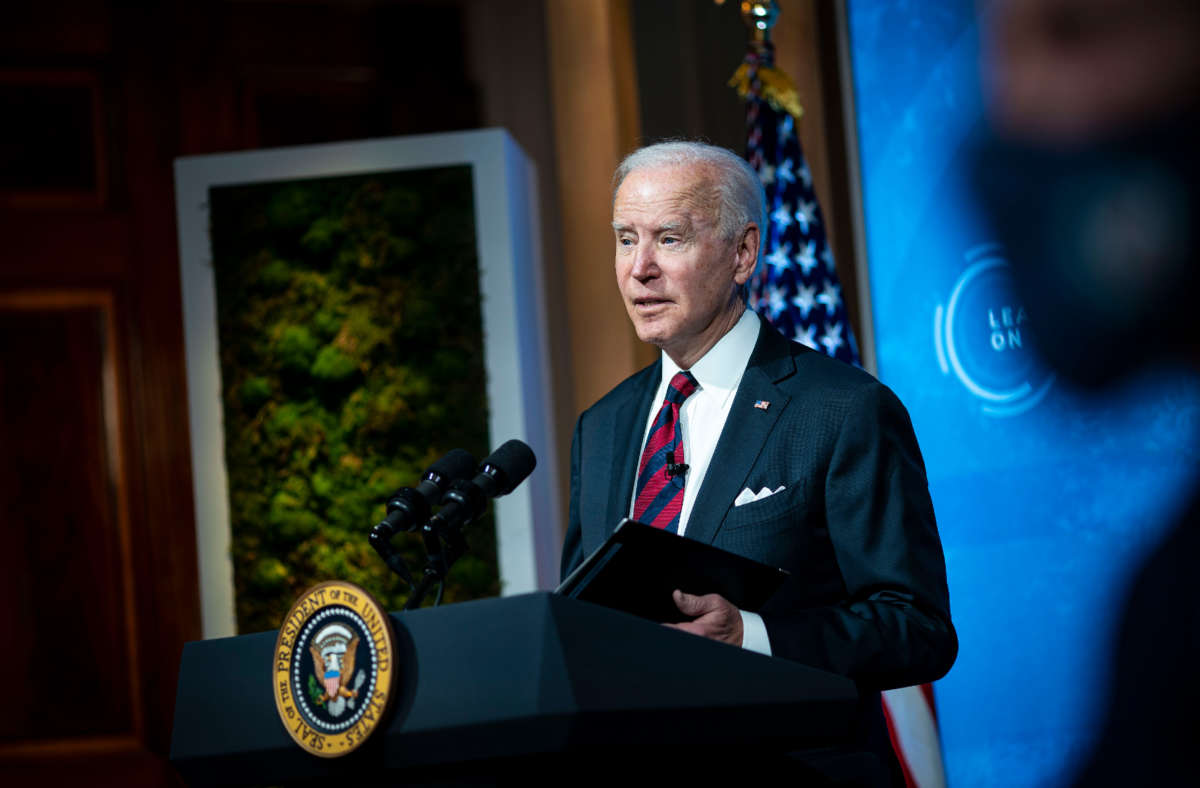Part of the Series
Covering Climate Now
President Joe Biden on Thursday has pledged to cut carbon emissions from the U.S. to half of what they were in 2005 by the end of this decade. His announcement came on the first day of a virtual climate summit hosted by Biden.
“I’ve talked to the experts, and I see the potential for a more prosperous and equitable future,” said Biden in remarks Thursday morning. “The signs are unmistakable. The science is undeniable. The cost of inaction just keeps mounting.”
In his speech, Biden emphasized the creation of high-quality, union jobs doing things like capping abandoned oil wells, restoring mines and installing electric vehicle charging stations across the country.
Biden’s pledge to reduce emissions is part of the U.S.’s share of Nationally Determined Contributions (NDC) to the Paris Agreement and is double the goal of an emissions reduction of 25 percent by 2025 that President Barack Obama set during his presidency. Former President Donald Trump infamously withdrew from the Paris Agreement as one of his last actions in office.
“Many would think that that’s not doable. But I would argue that there’s opportunities for us to be able to be very aggressive in what it is going to take for that opportunity,” Biden’s national climate adviser Gina McCarthy told NPR. “This is not a challenge that we should shy away from.”
The U.S. has steadily been decreasing its carbon emissions but at a sluggish rate; we’re on track to hit only 14 to 18 percent emissions below 2005 levels by 2025, missing Obama’s original goal. Research has shown that, in order to slash emissions in half in less than nine years, the coal industry will need to disappear completely.
Still, climate activists say that Biden’s NDC is not enough to avoid a catastrophic amount of climate change and global warming.
The U.S. Climate Fair Share Project, backed by a coalition of over 175 climate organizations called the U.S. Climate Action Network, calls on Biden to cut domestic emissions by 70 percent of what they were in 2005. They also call for the U.S. to contribute its “fair share” by committing to helping developing countries to cut emissions, in total, by 195 percent — in other words, working to cut more than the U.S.’s own share of emissions.
“This isn’t just about doing what’s right, it’s about not surpassing the 1.5 degree threshold” of global warming that climate scientists have warned is a dangerous level of warming, said Sriram Madhusoodanan, director of Corporate Accountability’s U.S. Climate Campaign, in a statement. “Without keeping fossil fuels in the ground, drastically reducing emissions immediately, and advancing real, accessible solutions at scale, we are on track to blow past the goals of the Paris Agreement.”
Though Biden has made lofty promises on the campaign trail with regard to climate, he has still, in many ways, refused to cut ties with the oil and gas industry. Meanwhile, before the pandemic hit, oil and gas production was soaring, which Biden has done little to address, climate advocates say.
“Both the NDC and the Biden administration’s proposed infrastructure plan fail to halt new fossil fuel infrastructure, including destructive oil and gas pipelines across the country. Biden has yet to take action to limit U.S. fossil fuel exports,” said Jean Su, director of the Center for Biological Diversity’s Energy Justice program, in a statement.
“And while President Biden has implemented a laudable moratorium on new federal oil and gas leasing,” Su continued, “he has yet to match the decisive leadership of other countries such as Denmark, which has reached broad agreement to cancel ongoing leasing, ban all future oil and gas licensing, and set a final phase-out date of 2050 for all fossil fuel extraction.”
Progressive legislators, meanwhile, have put out their own climate legislation to push Biden to go further in his ambitions. Rep. Alexandria Ocasio-Cortez (D-New York) and Sen. Ed Markey (D-Massachusetts) reintroduced their Green New Deal resolution on Tuesday, laying out a bold road map for climate action with an emphasis on justice.
Though it calls for a similar emissions reductions timeline to Biden’s NDC, the resolution and related proposals go further in their calls for the funding of climate-related projects. “Do we intend on sending a message to the Biden administration that we need to go bigger and bolder?” Ocasio-Cortez said at a press conference unveiling the legislation. “The answer is absolutely yes.”
Media that fights fascism
Truthout is funded almost entirely by readers — that’s why we can speak truth to power and cut against the mainstream narrative. But independent journalists at Truthout face mounting political repression under Trump.
We rely on your support to survive McCarthyist censorship. Please make a tax-deductible one-time or monthly donation.
